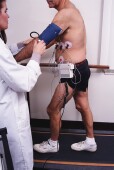Stress testing rate varies significantly across hospitals within Veterans Affairs system
WEDNESDAY, July 22, 2015 (HealthDay News) — In the Veterans Affairs (VA) health care system, nearly 40 percent of patients undergo stress testing in the two years following percutaneous coronary intervention (PCI), according to a study published online July 21 in Circulation: Cardiovascular Quality and Outcomes.
Steven M. Bradley, M.D., M.P.H., from the VA Eastern Colorado Health Care System in Denver, and colleagues examined the rates of stress testing among VA patients who underwent PCI from October 2007 through June 2010. Medicare eligible patients were excluded to avoid the influence of Medicare eligibility on rates of stress use testing in the VA. Hospital-level variations in risk-standardized rates of stress testing were examined, and the correlation with one-year mortality and myocardial infarction was determined.
The researchers found that 21.8 percent of the 10,293 patients undergoing PCI at 55 VA hospitals had a stress test performed within one year and 37.9 percent within two years of PCI. Most stress tests (79.8 percent) were performed with nuclear imaging. At 14 hospitals, the hospital-level risk-standardized rate of stress testing differed significant from the average, with eight hospitals significantly below and six significantly above the average stress testing rate. There was no correlation observed for hospital-level risk-standardized stress testing rates with risk-standardized mortality or myocardial infarction rates (P = 0.08 and 0.14, respectively).
“These findings suggest that opportunities to optimize the use of stress testing are still present in integrated health care systems,” the authors write.
Copyright © 2015 HealthDay. All rights reserved.








